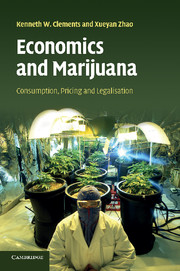Book contents
- Frontmatter
- Contents
- List of figures
- List of tables
- About the authors and contributor
- Acknowledgements
- 1 Introduction
- 2 Microeconometric evidence on marijuana consumption
- 3 The pricing of marijuana
- 4 More on the economic determinants of consumption
- 5 Decriminalising and legalising marijuana
- 6 Are Australians unique?
- 7 Perspectives
- Index
6 - Are Australians unique?
Published online by Cambridge University Press: 19 January 2010
- Frontmatter
- Contents
- List of figures
- List of tables
- About the authors and contributor
- Acknowledgements
- 1 Introduction
- 2 Microeconometric evidence on marijuana consumption
- 3 The pricing of marijuana
- 4 More on the economic determinants of consumption
- 5 Decriminalising and legalising marijuana
- 6 Are Australians unique?
- 7 Perspectives
- Index
Summary
Introduction
The previous chapters have dealt with the workings of the markets for marijuana and related commodities in Australia. Are these results applicable to other countries, or are they specific to Australia? This chapter addresses this question in a number of ways.
A useful starting point is the distinction between the objective and subjective determinants of demand for any product. Real income and relative prices are objective, whereas tastes are subjective. It is usual to take tastes as constant so that they play no role in the economic explanation of consumption. The hard-line interpretation that tastes are an immutable constant is a major tenet of Chicago economics and has long been championed by Chicagoans such as Becker, Friedman and Stigler (Friedman, 1962; Stigler and Becker, 1977). In essence, the proposition that tastes are constant takes the application of the economics of utility maximisation to its logical conclusion, whereby it is only the observable economic variables – income and prices – that determine consumption. To add the unobservable variable “tastes” to this list of determinants is in a sense unscientific, as it can explain any behaviour, no matter how unorthodox. In other words, there is no conceivable evidence that could ever reject the hypothesis that variations in consumption are determined by changes in tastes. To put this in yet another way, to ascribe observed behaviour to variations in tastes really amounts to admitting ignorance as to the fundamental causes.
- Type
- Chapter
- Information
- Economics and MarijuanaConsumption, Pricing and Legalisation, pp. 350 - 405Publisher: Cambridge University PressPrint publication year: 2009



